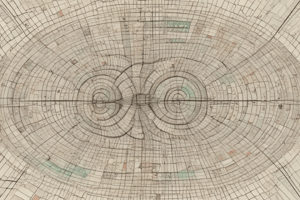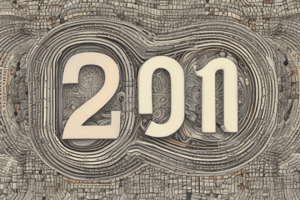Podcast
Questions and Answers
Which of the following statements about prime numbers is true?
Which of the following statements about prime numbers is true?
- Prime numbers cannot be negative.
- All even numbers are prime numbers.
- A prime number has exactly two distinct positive divisors. (correct)
- Every integer greater than 1 is a prime number.
What is the least common multiple (LCM) of 12 and 18?
What is the least common multiple (LCM) of 12 and 18?
- 72
- 54
- 36 (correct)
- 24
Which of the following numbers is classified as an irrational number?
Which of the following numbers is classified as an irrational number?
- $ rac{5}{4}$
- 0.75
- $ rac{22}{7}$
- $ ext{sqrt}(2)$ (correct)
If 75% of a number equals 60, what is the number?
If 75% of a number equals 60, what is the number?
What is the greatest common divisor (GCD) of 24 and 36?
What is the greatest common divisor (GCD) of 24 and 36?
Study Notes
Prime Numbers, Composite Numbers, and Factorization
- Prime numbers are whole numbers greater than 1 that are only divisible by 1 and themselves.
- Composite numbers are whole numbers greater than 1 that have more than two factors.
- Factorization is the process of breaking down a number into its prime factors.
Least Common Multiple (LCM) and Greatest Common Divisor (GCD)
- The LCM is the smallest number that is a multiple of two or more given numbers.
- The GCD is the largest number that divides two or more given numbers without leaving a remainder.
Fractions, Decimals, and Percentages
- A fraction represents a part of a whole.
- Decimals are a way to express fractions in a base-10 system.
- Percentages are fractions where the denominator is 100.
Ratios, Proportions, Rational, and Irrational Numbers
- A ratio compares two quantities.
- A proportion is an equation stating that two ratios are equal.
- Rational numbers can be expressed as a fraction of two integers.
- Irrational numbers cannot be expressed as a fraction of two integers.
Exponents and Square Roots
- Exponents indicate the number of times a base is multiplied by itself.
- A square root is a number that, when multiplied by itself, equals a given number.
Studying That Suits You
Use AI to generate personalized quizzes and flashcards to suit your learning preferences.
Related Documents
Description
This quiz covers essential concepts in number theory, including prime and composite numbers, factorization, least common multiple, and greatest common divisor. Additionally, it explores fractions, decimals, percentages, and the relationships between rational and irrational numbers. Test your understanding of these foundational mathematical concepts.




